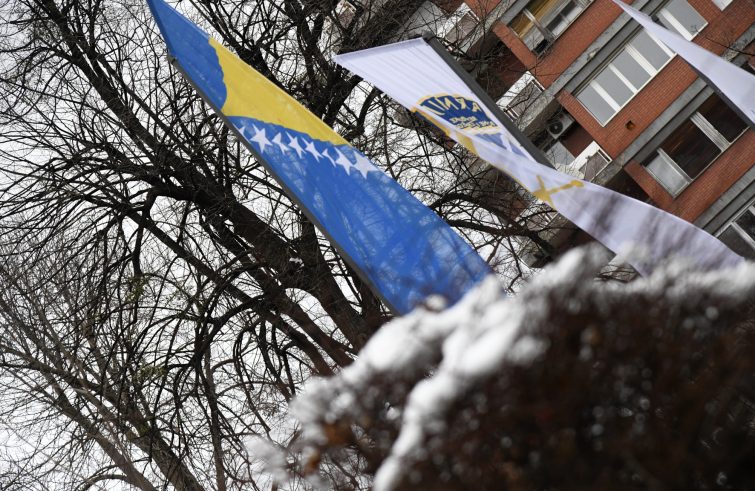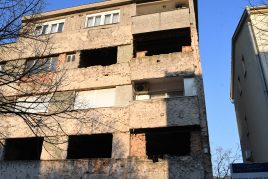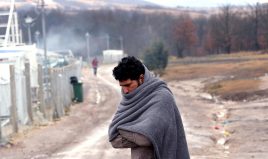
The war in Bosnia, one of the darkest pages of the conflicts in former Yugoslavia (1991-1995), erupted in March thirty years ago. Thousands of Italian volunteers joined humanitarian missions to help the war-stricken populations and contribute to peace-building efforts, some of them even at the cost of their own life. Italy has always enjoyed excellent relations with Bosnia (BiH), and it was among the first members of the International Community to open an embassy in Sarajevo on November 6, 1996. Italy had already been present in Bosnia since April 1994 with a preliminary diplomatic representation (in the form of a Special Diplomatic Delegation). However, the diplomatic relations between Italy and Bosnia-Herzegovina date back 159 years – the first Italian Consulate General in Sarajevo was opened on June 20, 1863. “Italy is among the most staunch supporters of the Balkan country’s Euro-Atlantic integration process,” said the Italian Ambassador to Bosnia, Marco Di Ruzza, interviewed by SIR in Sarajevo.
 Ambassador, how would you define the relations between Italy and Bosnia?
Ambassador, how would you define the relations between Italy and Bosnia?
Excellent, I must say. The Balkan-Adriatic region has historically been high on the list of the priority areas of our foreign policy, and Italy also enjoys very dynamic and fruitful cooperation ties with Bosnia-Herzegovina. High-level political dialogue has recently intensified, following the mission to Sarajevo by the Undersecretary for Foreign Affairs, Benedetto Della Vedova, on February 10-11. Against the political backdrop of Bosnia and Herzegovina, where unfortunately serious inter-ethnic tensions persist – owing to a never completed reconciliation process in the wake of the Dayton Accords – Italy is greatly appreciated for its constructive and inclusive approach, involving all the key players in an attempt to resume the dialogue. Furthermore, economic and trade relations between the two countries are in very good shape and are seeing a marked upward swing. Italy was BiH’s top export partner in 2021 in absolute terms, ahead of Germany, and its second largest trading partner overall. Our Embassy is currently promoting a project envisaging the first-ever platform that groups all Italian companies and businesses according to a national chamber format. The newly-formed partnership will be presented soon with a public event. We are very proud of this initiative, as it offers the opportunity to build unique synergies between our businesses, while at the same time strengthening the overall standing of our country in BiH.
What efforts are being made by Italy in the area of cultural relations?
Here too Italy is a major partner of Bosnia-Herzegovina. Our efforts are focused on fulfilling the marked attraction of the Bosnian-Herzegovinian general public for our culture and for Italian products overall, with a rich programme of events and promotions. Major thematic events, such as those focusing on the Italian language, design, cuisine and movies, are very successful and receive extensive media coverage. We collaborate closely with BiH national television and with a network of private radio stations connected to Radio Sarajevo, which enables us to enhance the value of Italian culture throughout the country. We have recently succeeded in reviving the ”Ars Aevi” Museum of Contemporary Art project, following the project developed by Renzo Piano – a prestigious and renowned post-war cultural renaissance initiative that had been halted for a very long time – through an agreement between the Canton and the City of Sarajevo. Thanks to the support of our Italian Agency for Development Cooperation (AICS), we will provide funding for the implementation of the project for the museum – a key step in the kick-off of construction works – thereby contributing an additional Italian touch to a project in which we have played a leading role right from the start. Finally, I must point out that, in order to strengthen our cultural presence in BiH, the Ministry of Foreign Affairs and International Cooperation plans to inaugurate an Italian Cultural Institute in Sarajevo. This initiative is expected to provide further impetus to bilateral cultural relations.
Investing in culture also means pursuing paths of dialogue and reconciliation, more necessary than ever in Bosnia, a country that is still recovering from the wounds of the war…
Investing in culture means not only to consolidate the friendship between Italy and BiH, it also means contributing to paths of reconciliation and inter-ethnic dialogue, thereby building bridges in a yet overly fractured country. With this same spirit we support a number of initiatives through AICS, such as the ‘Via Dinarica’, created in conjunction with UNDP, the United Nations Development Programme, which promotes dynamic and sustainable tourism aimed at enhancing the natural attractions of BiH while contributing to BiH’s economic growth. Another ambitious project launched with UNDP is ‘BRIDGE – Building Relations for Intercultural Dialogue in Bosnia and Herzegovina’, designed to foster intercultural dialogue to bridge the social gap between the country’s various communities, involving young people in particular. UNDP is our partner in a new initiative that is very important to us: the ‘Green Network’ – a platform we have created with associations and NGOs involved in environmental protection and enhancement projects.
The war in Bosnia broke out exactly 30 years ago. Which specific actions and policies has Italy put in place to support the post-war reconstruction of the country?
Besides our commitment to political cooperation, I have personally been present at the signing of numerous agreements with BiH to promote trade, investment and cooperation in the maritime sector. Back in 2000, when we held the presidency of the Council of Europe, as we do now, we actively supported BiH’s membership of the organisation. It is worth mentioning the extraordinary commitment of Italian Cooperation in post-conflict reconstruction. Countless initiatives were undertaken along with substantial financial efforts, including through the non-profit sector – which is extremely important here – along with decentralised cooperation – a practice which saw many Italian Regions and regional agencies develop large-scale solidarity programmes in collaboration with local partners. I remember that at the end of the conflict, with the aim of giving continuity to the efforts initiated in Bosnia-Herzegovina during the emergency period, Italian Cooperation decided to support the ” ATLAS ” initiative (Atlas of Decentralised Cooperation for Human Development), to foster and promote “twinning” among a multitude of Italian and Bosnian-Herzegovinian local players and the non-profit realm. On the Italian side, the ATLAS initiative involved 30 Municipalities, ANCI Tuscany and the Region of Tuscany; on the Bosnian side, 22 Municipalities, 6 of which in Republika Srpska and 16 in the Federation of Bosnia and Herzegovina. It should be noted that – among the various donors involved – Italy was the country that contributed most to the reconstruction of the Bridge of Mostar, a Unesco heritage site, destroyed in November 1992 and reopened in July 2004 with a touching international ceremony attended also by Italian President Ciampi.
In its various dimensions, Italian civil society and the Italian Church have been consistently present and active in Bosnia since the outbreak of the war. What impact has this had on Bosnian society?
Civil society is a central element of the Italian presence in the country – which we should be very proud of. In Bosnia and Herzegovina, Italy is greatly respected and loved, also thanks to a wealth of social and humanitarian initiatives promoted by our NGOs, actively operating here since the outbreak of the war and which have grown to be key players in the local context. One of these are Caritas, IPSIA and the Red Cross, whose extraordinary contribution to migrant reception policies has been outstanding (notably their valuable activity at the Lipa Centre). Likewise the International Committee for the Development of Peoples (CISP), actively involved in projects for sustainable tourism and rural development. Re.Te also deserves a special mention, as it is the lead partner in a major project financed by AICS – the breast cancer screening programme in the Canton of Zenica-Doboj. The Piedmont Region is another long-standing partner of this project. In fact, it has been cooperating with that Canton since 1995, a clear example of decentralised cooperation.
In which way does Italy support the EU enlargement process in the Balkans and the European integration of Bosnia & Herzegovina?
In the context of the European Union our country is undoubtedly among those most concerned about the need for a serious and credible re-launch of the enlargement process. In this respect, I wish to draw attention to Resolution no. 8-00136, unanimously approved last September by the Chamber of Deputies’ Foreign and European Community Affairs Committee, which reaffirmed this commitment and requested the Government to act accordingly. Italy is therefore committed to ensuring that the European integration agenda for the Western Balkans is revived at a political and economic level. We are concerned that further delays, almost nineteen years after the Thessaloniki European Council, may encourage feelings of mistrust and disaffection for the EU among the populations concerned, especially among the younger generations, thereby fostering dangerous nationalist drives and third-party penetration of the area. The focus on young people and civil society is a distinctive feature of the Italian approach. Suffice it to say that last November, on the initiative of Minister Di Maio, the EU-Balkans Youth Forum was convened in Rome, offering young people from throughout the continent the opportunity to discuss issues of common interest, opening up new perspectives on EU-Balkan integration. The highlights of this event will be presented at the Conference on the Future of Europe.
How is BiH’s path towards the EU progressing?
Needless to say, Bosnia & Herzegovina’s progress for EU membership is, unfortunately, proceeding at a slow pace. This is partly due to the serious political and institutional crisis that has been gripping the country since last summer and which has resulted in a deadlock – or in any case low efficiency – of its national institutions. While it’s not the first time that this kind of short circuit has hit local political administration in the country, it’s probably the most serious and worrying crisis since the Dayton Accords. Now it is crucial for the country to pull itself together and swiftly resume the path of reform in accordance with the Fourteen Priorities identified by the European Commission in May 2019 in order for BiH to obtain candidate status (it is only a “potential candidate” at the moment.) The future of Europe, towards which all ethnic-national actors converge, needs to develop into the binding force that will motivate leading political players to responsibly reconvene around the negotiating table in the general interest of the country and its citizens.
What role does our country play in this process?
Italy has a very specific role – I shall mention just a few examples. Through the Ministry of the Interior, Italy, along with Germany, is spearheading an important project funded with European resources to improve the operating standards of judiciary and police agencies in the countries of the Western Balkans to facilitate their rapprochement to the EU. As I have ascertained in recent meetings with local interlocutors and our representatives, the project in Bosnia and Herzegovina is proceeding with encouraging results. Moreover, we are leading a ‘twinning’ project, also in a pre-accession perspective, which aims to harmonise the country’s phytosanitary legislation with European standards.
Corruption is clearly a major hindrance to Bosnia’s growth …
Since the beginning of my mandate I have been personally working on a project that kicked-off only recently: Italy’s Anti-Corruption Authority (ANAC) has promoted a structured series of training and refresher courses for the staff of the competent BiH agency for public procurement and it will also contribute to the revision of the operational handbook to be drafted by the Bosnian-Herzegovinian agency for updating the benchmark criteria and operating methodology of all the bodies and institutions in the country concerned by the process. Under the same initiative, the Inspectorate General of the Ministry of Foreign Affairs and International Cooperation held an on-line meeting with the executives of the Public Procurement Agency to discuss the transparency and corruption prevention system in place at the Ministry of Foreign Affairs and in its overseas agencies. Italian cooperation in this delicate sector is of crucial importance because – as reported also by Transparency International Bosnia and Herzegovina – corruption remains one of the most critical problems in the country. It is no coincidence that a serious commitment to combating this nefarious phenomenon through transparency policies appears in many points of the European reform agenda required of the country in terms of “Rule of Law.”
What characterises Italy’s “integrated and hard-working” presence in Bosnia?
The expression you used, “integrated and hard-working presence”, perfectly describes our BiH communities. We have recorded numerous “traditional” communities of citizens of Italian origin, originating from the historical emigration that started after 1878, when the districts of Bosnia and Herzegovina came under Habsburg administration. Migration flows were mainly from the Triveneto region, and in particular from Trentino. Numerous associations – in Sarajevo, Banja Luka, Prnjavor, Tuzla – are committed to preserving their Italian roots through various social and cultural initiatives. As previously mentioned, a number of fellow countrymen have recently arrived as entrepreneurs and traders, as NGO workers or working in the educational and academic fields. I would also like to mention the international officers (Italians are employed by many international organisations, such as the IOM, EU, OSCE and UNICEF) and our Military staff serving in the EUFOR-Althea Mission, who contribute to the mandate of the European Union force to ensure a stable and secure environment in a politically complex country.
Many analysts portray the Balkan area – Bosnia in particular – as a possible scenario for yet another war in the heart of Europe after Ukraine, also on account of resurgent internal secessionist drives. Bosnia-Herzegovina has not adopted a common official position on the Ukrainian crisis due to the different views of its three-member presidency. Do you agree with this analysis?
Given the politically polarised context, especially in the framework of the ongoing crisis, it is not surprising that the stance of Bosnia and Herzegovina with regard to the war in Ukraine – considering the public statements made so far by the country’s top institutional and political leaders – has hitherto evidenced differing positions. However, the fact remains that BiH has backed a number of decisive initiatives taken by the international community, voting in favour of suspending Russia’s Council of Europe membership, and adhering – in the UN General Assembly – to a joint EU declaration first, and then to the resolution condemning Russian aggression, calling on Moscow to cease military operations immediately.
 There is clear concern among Bosnians over this new potential war scenario…
There is clear concern among Bosnians over this new potential war scenario…
In the light of the tragic events of the 1992-1995 war, the local population is unquestionably worried that the crisis in Ukraine could also have repercussions on the Balkans, starting with Bosnia-Herzegovina which, as known, has a key role in the delicate regional balances owing to its ethnic peculiarities. Italy strongly believes that in the present circumstances the EU should have a stronger profile in the Western Balkans, especially in Bosnia-Herzegovina. The recent activation of approximately 500 personnel from EUFOR’s reserves, besides enhancing the surveillance capabilities of the European force, aims above all to reassure the citizens and the Bosnian-Herzegovinian authorities of the EU’s continued commitment to the country’s stability and security through a stronger presence on the ground. However, as specified by the local European Delegation, this is a purely precautionary measure at the moment, not connected to the detection of specific threats to security.
 Bosnia is one of the countries on the Balkan Route, the corridor through which non-regional migrants attempt to enter Europe from Turkey. Which policies has Italy adopted to help Bosnia in its reception efforts?
Bosnia is one of the countries on the Balkan Route, the corridor through which non-regional migrants attempt to enter Europe from Turkey. Which policies has Italy adopted to help Bosnia in its reception efforts?
Italy is actively supporting BiH in the area of migration policies with a view to strengthening the country’s management capacities with regard to this sensitive and important issue. As you pointed out, the territory of Bosnia and Herzegovina is one of the key legs of the Balkan Route given its proximity to the EU via the common border with Croatia. I should like to mention the agreement existing between the Ministry of Foreign Affairs and International Cooperation and the IOM. Thanks to allocations from the Maeci Migration Fund, this partnership has directly contributed to the creation of the new migrant reception centre in Lipa, which was officially opened last November. The centre’s facilities are clearly more efficiently organised, with greater accommodation capacity and more services than the camp previously set up by the armed forces in the same area, with military tents, as a temporary response to the emergency. With respect to the dramatic humanitarian situation of the winter of 2020, which was also the subject of extensive media coverage, significant progress towards tackling the situation has been made in just a few months, thanks to an effective coordination between the international community and the various local stakeholders at various levels of the country’s complex administrative structure. This is a concrete example of the importance of coordination for attaining goals in the collective interest. A further important contribution from Italy is the project, developed in agreement with the UN High Commissioner for Refugees (UNHCR), which has made it possible for some officials of Bosnia and Herzegovina’s Ministry of Security Foreign Service to be trained in Italy by our authorities for the purpose of upgrading their refugee status application management and processing skills.










